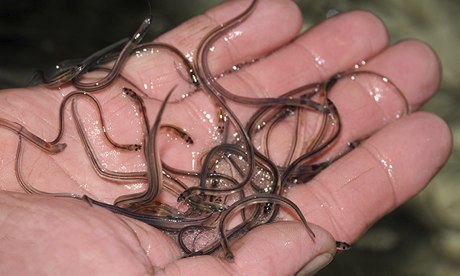
In a world obsessed with beauty, more and more people are prepared to go to painful lengths to preserve or even enhance their looks.
Now Britain's environmental health inspectors are being urged to be on their guard against new types of extreme, often unregulated treatments whose effects can be as eye-watering as they are dangerous. One particular concern for the inspectors is a new treatment that spas are looking to import from China which involves full-body immersion in a tank of eels. – an extension of the fish pedicures that have been popular in recent years t he treatment uses a number of eels – each eel about the length of a pencil, to exfoliate a skin. Wendy Nixon, a health and safety consultant, last week told a conference hosted by the Chartered Institute for Environmental Health (CIEH), the body which represents health inspectors, that there were problems with the procedure, especially for those wearing loose-fitting swimwear.
"In one case a stray eel found its way through the man's genitals and into his kidney, and he ended needing a three-hour operation," Nixon told the conference. "This is the sort of procedure that is coming your way."
The alarming example is apparently that of Zhang Nan, a 56-year-old man from Hubei province in China. "I climbed into the bath and I could feel the eels nibbling my body," Nan said shortly after the incident two years ago. "But then suddenly I felt a severe pain and realised a small eel had gone into the end of my penis."
A spokesman for the institute said that it was vital that any new beauty treatment was subjected to proper scrutiny by health professionals. "The CIEH is concerned when this or any new beauty treatment is being offered without a proper risk assessment to consider its impact on the public or the animals involved. Without such a risk assessment, it is not possible to provide official guidance or advice that can help inform the public and health professionals."
The beauty industry is turning its back on fish pedicures after customers raised concerns about the ethical treatment of animals. However, the treatments are now being offered at festivals and fairgrounds , according to the CIEH journal, Environmental Health News.
"I have been to big events for the leisure industry and they [the treatments] are working their way into gyms and these sorts of places, so keep an eye out for those," Nixon warned. "Anyone involved in these sorts of treatment should have at least a very minimum national occupational standard at a level-two pedicure unit."
But with Britons spending more than £5bn a year on beauty and grooming services at more than 15,000 beauty salons, regulating the industry and ensuring that minimum training standards are met is proving a constant battle for the inspectors. One growing concern is over the plethora of teeth-whitening procedures now on the market. Beauty therapists are being sold expensive training courses but are not told the procedures can be performed only by dentists or dental hygienists. The salons can, however, sell the teeth-whitening kit, prompting concern that the procedure is being carried out illegally by unqualified therapists.
Inspectors are also worried about the increasing use of hair-straightening products imported into the UK that have been found to contain concentrations of formaldehyde above the legal limit. Nixon said she knew of companies that had concealed the formaldehyde content in their products by referring to it as formalin or methylene glycol on their labels. The application of formaldehyde should be carried out only in well-ventilated areas. But many clients are unaware that they have been treated with the potentially dangerous chemical.
"Once the client has had these products applied, they go home and for the next few months every time they apply heat formaldehyde vapours will be given off, so they may suffer long-term ill health," Nixon said.
There are also heightened concerns about the regulation of tattoo and piercing parlours. There is currently no requirement that tattoo artists have any training. A government inquiry, the Keogh Review, made a series of recommendations to improve the regulation of cosmetic surgery, and health inspectors want tattoo parlours to be included in the proposals.
The CIEH lobbied for local authorities to have greater powers to take action against rogue tattoo artists. It also wants anyone carrying out tattooing or body piercing to undergo training in infection control.

